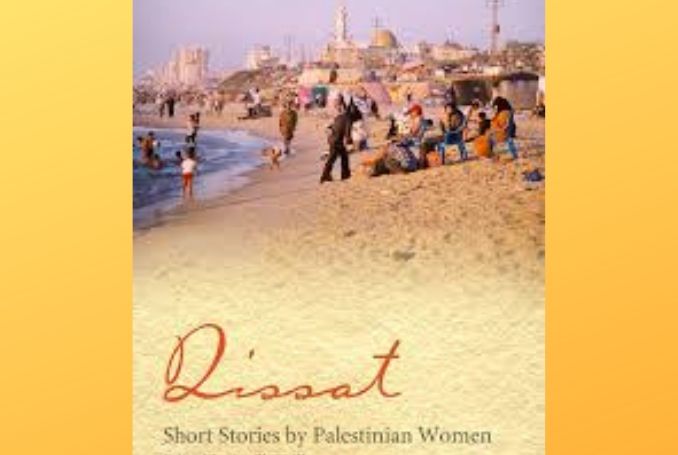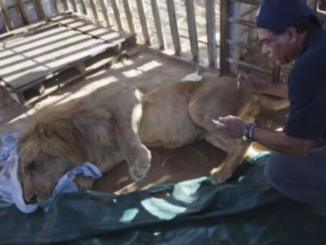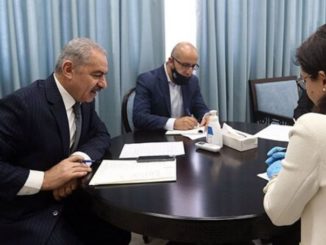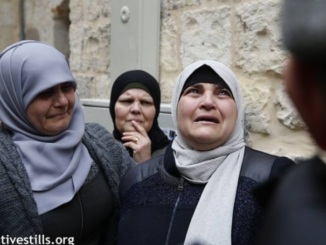
(Qissat: Short Stories by Palestinian Women Paperback. Jo Glanville, Editor. Telegram: May 1, 2007.)
The voice of the Palestinian woman is occupied twice over. First, by the Israeli bootheel whose half-century occupation of Palestine qualifies in innocent blood spilled, human rights debauched, and its persistent program of ethnic-displacement as the oppression of human beings in its original form. If this characterization does not suffice, I trust the reader will allow that with the Israeli military’s penchant for arresting guiltless, indigenous Palestinian children as young as eight and killing unarmed citizens and journalists in recompense for Palestine’s two-millennia long violation of expired Talmudic territory claims, the occupation of Palestine at the very least qualifies as oppression of human beings in its original, biblical form.
Second, depending on which of the more than twenty regional cantons she’s been caged into by Israel’s snaking Separation Wall, the Palestinian woman is prone to occupation by religious and social traditions that, in their most extreme cases, it is not an exaggeration to say represent the oppression of women in its original form either.
It could well be that in the fight for collective Palestinian emancipation, it is they who have the most to gain by individual emancipation who have also the most to offer the national dialogue. But just as the winding Separation Wall which defines every detail of Palestinian reality in the West Bank is far from a straight 180 degrees, so too is the line linking collective Palestinian emancipation and female liberation far from neat. There are, after all, no stipulations for female liberation in any of the failed or currently failing peace processes in the region. And the push for one will have to come from within and against Palestinian customs, not Israel.
The literary importance of such a voice, doubly oppressed, was at least felt to be one worth showcasing in 2006 by writer and journalist Jo Glanville, who assembled between the covers of a little known and nearly unreviewed anthology, Qissat, sixteen short stories written by Palestinian women bearing addresses from “Texas to Ramallah,” or, to be less specific and more categorical, from diaspora to Palestine proper.
It can be argued that the siege of Palestine moves and develops swiftly. Though on the other hand it can be said with equal truth that four to five generations deep into Israel’s land theft the siege moves in a torturously slow manner. Glanville writes an excellent introduction to the anthology that, in its characterization of the female predicament in Palestine and the difficulty of Palestinian fiction breaking through into Western audiences, is just as frustratingly modern as it was in 2006 (and 1996, and 1986, and 1976, and so on and so on).
Though it does show its age:
“Little Palestinian fiction breaks through the mainstream – with a few notable exceptions such as Liana Badr and Laila al-Atrash.”
While many in the circles of Palestinian solidarity may recognize the name Selma Dabbagh from Qissat’s table of contents, it is doubtful whether many of the rising generation of Palestinian advocates or that meager 19% of Americans who manage to read at least one book a year will be familiar with Badr and al-Atrash, whose works have not been reissued for some time and are, relative to Dabbagh, hard to come by. (Despite winning the 2016 International Prize of Arabic Fiction, al-Atrash’s Hymns of Temptation sits presently, untranslated into English).
The infrequent pace of Western interest in Palestine often precludes it the luxury of memory regarding Palestinian art and culture, let alone its history. Palestinian writers like Qissat’s “award-winning young novelist Adania Shibli,” have an easier go of winning brief international literary acclaim than they do of sticking in the psyche of the West. They also have a better chance of being translated into French or Italian than into English, two countries with very little pull in Palestine. Here, in academe, public taste, and even the Palestinian Solidarity Movement (PSM), Palestinian writers are as ghosts.
So, in an attempt to right at least sixteen of these wrongs, allow us a rendezvous with the likes of Badr, al-Atrash, Dabbagh, Shibli, and the twelve others of Qissat.
‘Barefoot Bridge’
The first story in the collection is “Barefoot Bridge” by Randa Jarrar, a story that begins us in Palestinian Diaspora, location: Kuwait. We have as narrator the eyes of a nameless child traveling with her family to visit Palestine upon the death of her grandfather, or “her Baba’s [father] Baba.” (Jarrar herself was born in Chicago, raised in Egypt and Kuwait and moved to the US during Saddam Hussein’s conveniently unremembered expulsion and persecution of Palestinians during the First Gulf War).
The narrative’s location in the young half-Palestinian child allows a purity of observation that leaves the absurdities of the Israeli Occupation in stark relief: “On the airplane I take out a map from the pocket in the seat in front of me, and on it Palestine is the country stuck to Egypt, so I ask Baba [father], ‘Why can’t we just drive there, or take a plane straight there?’” An answer to this question which most in the West have either stopped or never considered asking is not given to the young girl, but as the family’s journey unfolds in the innocence of the narrator’s perception, the profundity of the question deepens. Particularly the question’s first word. “Why.”
In a Jordanian taxi, the child senses the tension of her parents, and wishes to sate it by drawing everything she observes and showing her father:
“the leather in the taxi, the cucumber sandwich my brother half-ate, Baba’s stubble, the dried skin around his eyes, Mama’s lipstick-lined mouth, her face, the face of the rocks outside, the wind whipping in through the window.”
The child’s observation is unadulterated by a knowledge of the Palestinian persecution (of the Israeli past and present, as well as the one waiting for her family around the corner in Kuwait), and she intuits that sharing her innocent, uncorrupted perception might help her parents expunge their own experience and foresight about what will ensue at the border. Picking up as she does on every emotional development in her parents, she senses a growing nervousness as the taxi approaches a checkpoint, guarded by the men with “shiny rifles.” (We feel she is experiencing this degree of organized barbarity for the first time).
The family waits, gets onto a bus stuffed with Palestinian travelers. The bus stops. A soldier checks everyone’s passports and papers. Another insight from the child:
“The soldier inspects all our passports with a cigarette dangling out of his mouth. He never takes it off his lips. I think this is a neat trick, but I’m worried about the long piece of ash hanging from it.”
In other words, how sustainable is this model of human occupation? It’s a neat trick the way it keeps endlessly going on and on, but when will the ash fall to the floor, i.e. shit finally hit fan?
The bus goes on and then stops at a bridge. Bags are dumped onto counters, interrogations begin, the father is separated from wife and child. Between each of those previous commas lies our prime question: “Why?” Child-narrator and mother are then lorded over by armed female soldiers, the hair of which the narrator admires. Shoes are taken off and inspected. Why? The narrator questions how a grenade can fit into the thin heel of her sandal. All the women are stripped to their underwear. Why? “Then Mama farts a huge silent fart that stinks up the fitting room and forces the soldier to leave for a few seconds.” Nice.
After hours waiting, during which a theft of a traveler’s shoes occurs (“First my land, now my Gucci’s! God damn it”), the family is reunited and continues on in a packed bus to Jenin, going past “sliced rocks” that the child remarks look like her father’s face.
It is at the emotional climax in Jenin, where we might expect it, that we get the double purpose to the family’s residence in the Palestinian Diaspora. The child watches her father as he walks through his old one-room home, now abandoned and in ruins. There is no bathroom, inside or out. There is a white wall that the father’s sisters were all married against “‘like prisoners’” before the age of fifteen.
The child asks her father if he missed Palestine when he moved to Egypt, to which he responds:
“‘I’m glad you mention that, my girl. I was sad, but going to Egypt, going to university, gave me my freedom. Your aunts never received such an opportunity. I want more than anything in the world for you to have that opportunity… Do you understand this?’ he asks me, his voice filled with urgency… ‘It’s hard to explain this to you… Although I lost my home, I gained an education, which later became my home. This can also happen for you,’ he pauses, mines his mind for better words. ‘War is terrible. Terrible! But good things can come of it too.’”
The father is explaining the victory of the Palestinian strength and will: finding a way to grow and benefit from the hand (or lack thereof) dealt with you. When a shackle descends on you, you make sure to gain something new. When something is taken from you, you find a way to free a different part of yourself. Personal emancipation meets collective oppression, and we see the meaning of Liana Badr’s statement in Glanville’s introduction, that in the tandem of female liberation and Palestinian emancipation: “neither of them is valid without the other.”
The child’s father then takes a photo of the narrator against the same white wall his sisters were married against as children. In retrospect, from which this story is being told, the child-narrator sees “that there is a ladder at the left-hand side of it, propped up against the yellowed wall. Baba had left me an escape route.” Here we have a double emancipation, from the national situation and personal unfreedom, as well as two Palestinian emancipated – the daughter and the father, whose liberation is expressed best in graffiti on that stretch of Separation Wall in Bethlehem City, “I am not free until you are.”
‘A Thread Snaps’
Though the Israeli Occupation is quite hard to absent from a reader’s awareness, in “A Thread Snaps,” it is not mentioned, nor does it loom in the subtext. (Nor does it need to. Why must a Palestinian writer only write about the politics of Palestine?)
The story, banned when it first appeared in Jordan, is penned by Hazama Habayeb, another Palestinian exile from Kuwait, whose 2016 novel Velvet won the Naguib Mahfouz Prize, promising it an English translation due out [September 3, 2019].
In her own words, Habayeb depicts characters who suffer “not only because they are Palestinians… but also because they are humans with torn hearts and defeated souls” or, to put it plainly, Habayeb has liberated herself from the onus of Palestine in exchange for free reign of the subject matter. Therefore, “A Thread Snaps”’s narrative is instead within the occupied territory of Nuwwar, a girl quickly ascending out of childhood and into sexual maturity, yet still pinned to the domestic chores of the patriarchal home. Her only hope out is marriage, which she associates with the insatiable rise of the “thread” of her sexuality, “twisting into shape” at the sight of the passing young neighbor Ibrahim. Through the course of one hour, we see Nuwwar hopelessly aroused by her rigorous chores, washing floors, clearing drains, wiping toddlers after the bathroom.
She takes her only brief break in the bathroom, where the claim of an upset stomach frees her momentarily from her mother’s scrutiny:
“She closes her eyes and imagines that her smooth behind is salep cream stretched tight, with drops of water falling on it, cool and slow. When she cleans herself, she deliberately lets the spout of the plastic jug tickle her between the thighs… and a strange drowsiness creeps through her limbs, a drowsiness she’s only noticed recently. Nuwwar doesn’t understand it, this feeling, but it’s a short thread beginning far away, from deep down somewhere, and twisting rapidly into shape.”
She knows Ibrahim, who is looking soon to marry, is due by the house and makes sure to be sweeping the porch when he passes. They greet each other, “‘God give you strength Nuwwar.’” “‘And you Ibrahim!’” “‘God give you nothing, girl!’” her mother adds from behind her.
Nuwwar gathers clothes from the roof and brings them to the laundry room, scrubbing the waste and fecal stains from the underwear of her little brother, astonished at the hole of her father’s underwear (“Should it be that big?”), holding her washbowl “between her legs, her thighs pressing tight against it.” Even in this situation, she is helpless to the arousing sensation of the water and Surf detergent which slithers:
“Down either side of her thighs in a thin trickle of water which comes to a halt at the edge of her underpants, or maybe sneaks beneath them and goes inside. Her eyelids droop: a flash of coolness, then a prolonged sensation of warmth, and at last the shit breaks up.”
Trapped as she is the house, a sexual-circadian rhythm cannot help but pervade all of Nuwwar’s acts. The entrapment is measured by the two times Ibrahim passes the house, like a day broken into afternoon and midnight. Nuwwar has made sure to hide a slipper on the porch so she has another reason to greet Ibrahim as he passes for lunch.
This is her only chance at interaction with those of the male sex, besides her father, whose feet she is made to wash while she senses, by way of her “thread,” Ibrahim’s lunchtime approach. Arousal again pervades and projects:
“Her father feels her hands relax. ‘Rub harder, Nuwwar.’ ‘Okay, Dad!’ ‘More. Press harder.’” She makes to leave for the slipper on the porch, but her father refuses her exit. Her drowsiness begins and, as she feels Ibrahim pass the window without her on the porch to greet him, the thread of arousal and sexuality snaps and “thuds into the washbowl.”
Resigned, defeated, unsatisfied:
“Nuwwar bends over his [father’s] feet and rubs hard and presses, hard, all her limbs arching over his toes.
‘Rub harder, Nuwwar.’
‘Okay, Dad.’
‘Harder, girl.’
‘Okay, Dad. Okay. Okay.’”
But a marriage to Ibrahim is not a complete assurance of liberation from her slave-like domestic chores if Nuwwar’s own mother and the next story are any indication.
‘Other Cities’
Here with Badr’s tale, we are back at the question first posed by Randa Jarrar. Why can’t a Palestinian go directly to where they want to go? Though this time, it’s put in the words of housewife Umm Hasan, “Was it such a crime for a person to spend a day or two in Ramallah?” The question is as much posed to colonial Israel as to Umm Hasan’s husband, who for better or for worse does not like the idea of Umm Hasan putting herself into the hands of the Israelis outside the home.
Hasan’s desire to go to Ramallah, only 40 minutes away but requiring an entire day of waiting in various checkpoints to reach, is first asked by her children. They beg Umm Hasan and she puts it off, alluding to the dangers outside the home. In the regional canton of Hebron and its surroundings, where they live, she is “imprisoned in her home by settlers’ attacks, held hostage in her neighborhood by constant military patrols,” and lacks the proper ID to leave town. One sees her husband’s distress is not entirely unfounded. But the idea begins to obsess her and swearing by divorce, which men usually do (“May I be divorced if we don’t go to Ramallah within the week”), Umm Hasan makes a secret trip of it while her husband is out of the house.
Traveling with her six children, and leaving Hebron for the first time in her life, Umm Hasan encounters a reality of the Occupation she has never witnessed before: settlers with assault rifles on the highway, active thefts of Palestinian property, the constriction of roadblocks and checkpoints separating Hebron from its surrounding land and the adjacent “other cities.” Initially, however, the regular seas of security seem to part for her and her family, yet remain always threatening. After a day spent walking the city and eating street food (those who have been to Palestine understand the draw of this pleasure), Umm Hasan lies in a hotel bed with her children on the verge of going broke, and dreams the reverse of the Abrahamic myth where, instead of the sacrifice of Abraham’s son Isaac being turned into a sheep, she dreams of a sheep being continually turned into an infant “that resembled her own.”
The image of the sheep is prompted by the earlier sight of an Israeli settler running along the highway with a stolen sheep in his arms, a Palestinian farmer in hot pursuit. Though, because the settler was armed with an assault rifle, the Palestinians driving along the highway do not risk pulling over to help their own countryman. Realizing the potential sacrifice she is making with regard to her children’s lives, who as it turns out also lack proper IDs and run the risk of being deported out of Israel if they are found out, Umm Hasan decides to return to Hebron the following day.
Here, the reality of security descends on her and her children, stopped in a bus in “hellish heat” by soldiers who, after checking IDs, have no purpose in keeping the bus stopped but do so anyways. (They do have a purpose, of course, of punishing and torturing human beings who have committed the sin of being born Palestinian in territory that a 3000-year-old text deems the exclusive property of the religious sect of Judaism, rife with violent instructions with regard of how to deal with the indigenous populations. See Deuteronomy).
After hours of waiting, Umm Hasan’s youngest child has diarrhea and Umm Hasan, for the first time in this particular grapple hold of the Occupation, steps out of the bus with her infant in her arms to the astonishment of the Palestinians and Israeli soldiers, and admonishes the Israeli captain “as if she lived in another world; as if she knew nothing of the danger of approaching these people, any one of whom could open fire on the pretext that she was a saboteur with a belt of explosives around her waist.” In this context, her infant is not unlike Isaac, being brought toward the jaws of death.
The Israeli captain, however, has an epiphany, realizing he is escaping something through his work, that he is punishing himself. The captain lets them go and Umm Hasan returns to Hebron knowing, in spite of every possible injunction to the simplest of travels, “there were still plenty of ways” to move through Palestine. To the father’s words in “Barefoot Bridge,” Umm Hasan has gained a freedom.
– Nicholas Vincenzo Barney is an American writer, journalist, and advocate for human rights in Palestine. After the death of a close friend from the West Bank, Barney has made several trips to Palestine and has spent considerable time living with Palestinian families. He contributed this review to The Palestine Chronicle.







